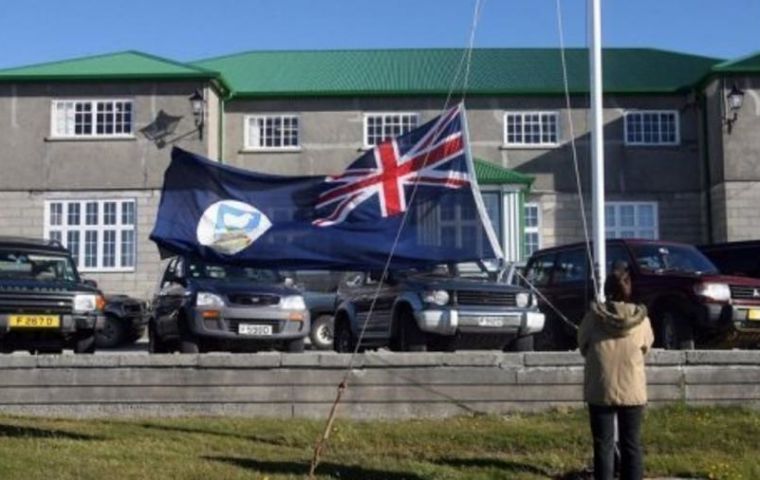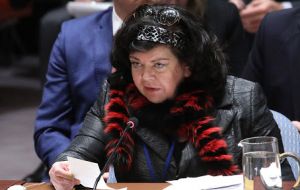MercoPress. South Atlantic News Agency
UK message to UN: Falklands' people must participate in any discussions on their future
 British reply to the Argentine letter sent on 3 January, to the UN addressed to the Secretary-General, about the Question of the Falkland Islands
British reply to the Argentine letter sent on 3 January, to the UN addressed to the Secretary-General, about the Question of the Falkland Islands  Letter dated 20 February 2020 from the UK Permanent Representative the United Nations, Karen Pierce addressed to the Secretary-General
Letter dated 20 February 2020 from the UK Permanent Representative the United Nations, Karen Pierce addressed to the Secretary-General British reply to the Argentine letter sent to the United Nations addressed to the Secretary-General, about the Question of the Falkland Islands: Letter dated 20 February 2020 from the Permanent Representative of the United Kingdom of Great Britain and Northern Ireland to the United Nations addressed to the Secretary-General.
”In accordance with instructions received from the Government of the United Kingdom of Great Britain and Northern Ireland, I have the honour to refer to the letter dated 3 January 2020 from the Permanent Representative of Argentina to the United Nations addressed to you. I should be grateful if you would circulate the present letter and its annex as a document of the General Assembly, under agenda item 43. (Signed) Karen Pierce
“The United Kingdom is clear about both the historical and legal position on the sovereignty of the Falkland Islands. No civilian population was expelled from the Falkland Islands on 3 January 1833. An Argentine military garrison had been sent to the Falkland Islands three months earlier in an attempt to impose Argentine sovereignty over British sovereign territory. The United Kingdom immediately protested and later expelled the Argentine military garrison on 3 January 1833. The civilian population, who had previously sought and received British permission to reside on the Islands, were encouraged to remain. The majority voluntarily chose to do so. In 1833, the territorial borders of the Republic of Argentina did not include the geographical southern half of its present form, nor any territory in the Falkland Islands, Antarctica, or South Georgia and the South Sandwich Islands. The land that now forms the Argentine province of Tierra del Fuego, of which the Republic of Argentina purportedly claims the Falkland Islands forms a part, did not itself form part of the Republic of Argentina until approximately half a century after 1833, by which time the current Falkland Islands people had lived and raised two generations on the Islands. British sovereignty over the Falkland Islands dates back to 1765, some years before the Republic of Argentina even existed.
”The United Kingdom’s relationship with the Falkland Islands, and all of its overseas territories, is a modern one based on partnership, shared values and the right of the people of each territory to determine their own future. The United Kingdom Government attaches great importance to the principle and the right of self-determination as set out in Article 1.2 of the Charter of the United Nations and article 1 of the International Covenant on Civil and Political Rights, respectively.
“As such, the United Kingdom remains committed to defending the rights of the people of the Falkland Islands to determine their own political, social and economic future. This includes unequivocal support for the right of the Falkland Islanders to develop their natural resources for their own economic benefit. Hydrocarbon exploration in the Falkland Islands is a legitimate commercial venture regulated by the legislation of the Falkland Islands Government, in strict accordance with the United Nations Convention on the Law of the Sea. Argentine domestic law does not apply to the Falkland Islands. The politically motivated decision by a previous Argentine Government to target the assets of, and to criminalize the activities of individuals working for, international companies involved in Falklands hydrocarbons is a wholly unacceptable attempt to exercise extraterritorial jurisdiction, and has no legal justification whatsoever. Furthermore, it has dangerous implications for global business and the principles of free trade.
”The Republic of Argentina regularly refers to regional statements of diplomatic support for sovereignty negotiations, including United Nations resolutions. However, none of these modify or dilute the obligation on States to respect the legally binding principle of self-determination. This means there can be no dialogue on sovereignty unless the Falkland Islanders so wish. The 2013 referendum – in which 99.8 per cent of those who voted wanted to maintain their current status as a territory of the United Kingdom – sent a clear message that the people of the Islands do not want dialogue on sovereignty.
“Additionally, the Government of Argentina regularly refers to the military presence in the Falkland Islands. The United Kingdom’s forces in the South Atlantic are entirely defensive, and are at the appropriate level to ensure the defence of the Falkland Islands against any potential threat. In fact, the United Kingdom’s military presence has significantly reduced over time. The United Kingdom continues to keep its force levels under review.
”The United Kingdom and the Falkland Islands Government remain willing to discuss areas of mutual interest in the South Atlantic, with the precondition that representatives of the Falkland Islands Government must participate in any discussion of issues that affect the Falkland Islands people directly”.




Top Comments
Disclaimer & comment rules-

-

-

Read all commentsgreetings to the british from a nigerian from west africa I would like to commend the uk for its efforts in ensuring the recovery of whales in south georgia and south sandwitch islands which has been british since 1775 when captain cook claimed it for britain and wish them as we say in nigeria more grease to their elbow keep up the good work and good luck Gods speed
Mar 04th, 2020 - 10:59 am +9A good summation of the Falklands situation , nothing new, but it succinctly covers all the issues, from the UKs historical sovereignty, the human rights of the Islanders to their territory to the illegal behaviour of the Argentine government in trying to disrupt legitimate commercial actives in and around the Falklands .
Mar 04th, 2020 - 02:37 pm +6There should be more of this type of pushback from the UK . One can only trust that the UN gives this the credence that it deserves.
Something in this letter that MoreCrap should try to grasp.
Mar 04th, 2020 - 11:26 pm +6“The United Kingdom is clear about both the historical and legal position on the
sovereignty of the Falkland Islands. No civilian population was expelled from the
Falkland Islands on 3 January 1833. An Argentine military garrison had been sent to
the Falkland Islands three months earlier in an attempt to impose Argentine
sovereignty over British sovereign territory. The United Kingdom immediately
protested and later expelled the Argentine military garrison on 3 January 1833. The
civilian population, who had previously sought and received British permission to
reside on the Islands, were encouraged to remain. The majority voluntarily chose to
do so. In 1833, the territorial borders of the Republic of Argentina did not include the
geographical southern half of its present form, nor any territory in the Falkland
Islands, Antarctica, or South Georgia and the South Sandwich Islands. ... British sovereignty over the Falkland Islands dates back to 1765, some
years before the Republic of Argentina even existed.” [UN Document A/74/721]
MoreCrap really needs to read more.
Commenting for this story is now closed.
If you have a Facebook account, become a fan and comment on our Facebook Page!